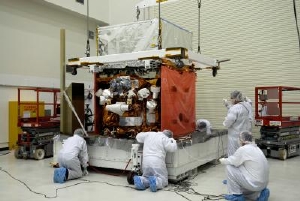Apr 2 2008
Preparations for launching NASA's Gamma-ray Large Area Telescope (GLAST) satellite are underway at NASA's Kennedy Space Center (KSC), Fla. NASA KSC's "NASA Expendable Launch Vehicle Status Report" on Thursday, March 20, noted that GLAST's twin solar panels have been attached. The panels will provide electrical power for GLAST after its launch into earth orbit.
 At the Astrotech payload processing facility, General Dynamics technicians check GLAST before the installation of the solar arrays, as an overhead crane is lowered over it. (Credit: NASA/KSC)
At the Astrotech payload processing facility, General Dynamics technicians check GLAST before the installation of the solar arrays, as an overhead crane is lowered over it. (Credit: NASA/KSC)
As part of the process for preparing GLAST for launch, the satellite's various components are tested and re-tested. During the week of March 24, solar panel deployment and solar panel lighting were tested. Comprehensive performance tests were also done, that included end-to-end communications testing through the Tracking and Data Relay Satellite (TDRS) system.
At Pad 17-B on Cape Canaveral Air Force Station, buildup of the Delta II rocket began Monday, March 24, with the hoisting of the first stage. Work to attach the nine strap-on solid rocket boosters followed. Stacking of the second stage is currently planned for April 3.
GLAST is slated for launch aboard a Delta II 7920-H rocket from the Cape Canaveral Air Station on May 16. The window for launch runs between 11:45 a.m. – 1:40 p.m. EDT.
GLAST is a powerful space observatory that will explore the most extreme environments in the Universe, where nature harnesses energies far beyond anything possible on Earth. It will search for signs of new laws of physics and what composes the mysterious Dark Matter, explain how black holes accelerate immense jets of material to nearly light speed, and help crack the mysteries of the stupendously powerful explosions known as gamma-ray bursts.
NASA’s GLAST mission is an astrophysics and particle physics partnership, developed in collaboration with the U.S. Department of Energy, along with important contributions from academic institutions and partners in France, Germany, Italy, Japan, Sweden, and the United States.